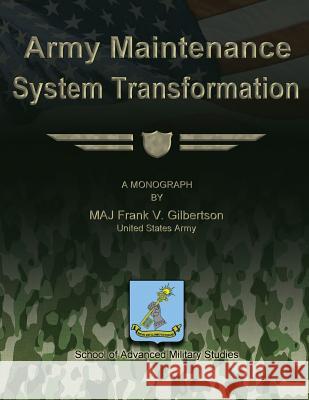Army Maintenance System Transformation » książka
Army Maintenance System Transformation
ISBN-13: 9781479194186 / Angielski / Miękka / 2012 / 80 str.
The first official use of the term "transformation" is often attributed to the document Joint Vision 2010 published in 1996. Logistics, an integral component to this transformation, is adjusting as well. As a part of logistics transformation, maintenance has been thoroughly reworked. Maintenance transformation must address the issues presented by a transforming Army while it is at war. General Systems Theory offers many valuable insights into how a transformed maintenance system should develop. Used in conjunction with pertinent historical data and developed with Army transformation goals in mind, general systems thinking can provide the framework for guiding maintenance transformation. System aspects such as stability, interaction and feedback provide the universal qualities that any valid system must possess. Applying these aspects to the pillars of Army maintenance system transformation, multi-capable maintainer, conceptual foundations, maintenance organization and CL IX (repair parts), will provide principles to guide the development of transformation as a whole, recognizing the impact of several systems that must work together. The paper will show that maintenance transformation, as it is understood currently, is insufficiently resourced to meet the requirement of adequately maintaining the Army's operational readiness. A section is devoted to the issues that face the maintenance system today that can be resolved without solutions that are transformational in nature or spurred by a revolution in military logistics and mainly involve enforcing standards and instilling discipline into the maintenance process. Finally, the impact of the debate between effectiveness and efficiency proves useful in prioritizing efforts and designing the maintenance system to ensure it is resourced to sustain the Army in its continuing mission of fighting and winning our Nation's wars.
Zawartość książki może nie spełniać oczekiwań – reklamacje nie obejmują treści, która mogła nie być redakcyjnie ani merytorycznie opracowana.











